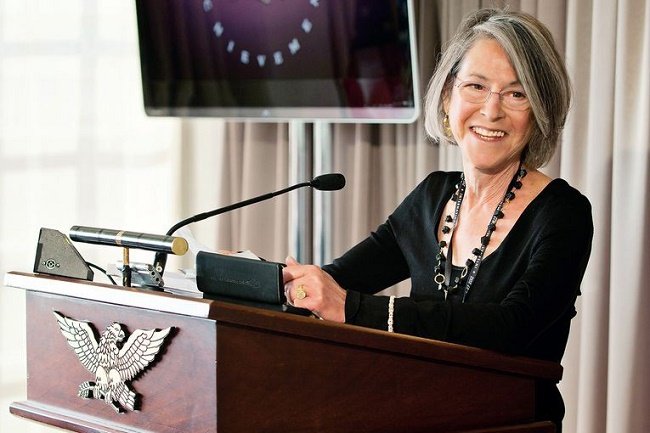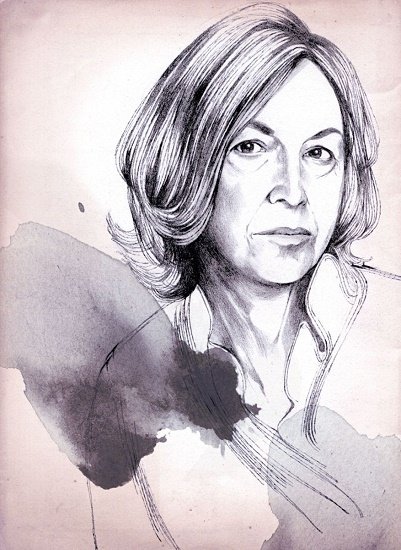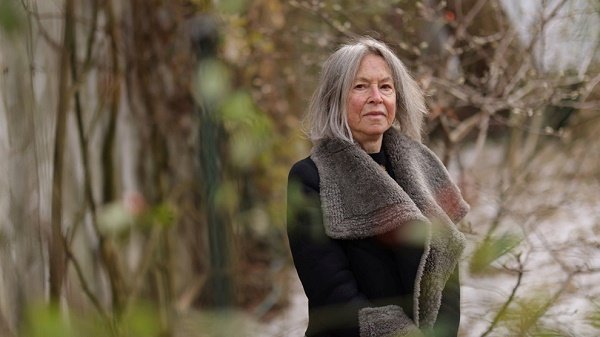Para despedir (y volver) a la poeta Louise Glück | To bid farewell (and return) to the poet Louise Glück
Se fue, callada, casi misteriosamente, a sus 80 años, la poeta estadounidense, Premio Nobel de Literatura 2020, Louise Glück, el pasado 13 de octubre. Quien fuera, además de poeta, ensayista y profesora universitaria de literatura, nos sorprende con su muerte, así como fuimos gratamente sorprendidos en octubre de 2020 con el otorgamiento del Nobel a su obra.
============
The American poet, Nobel Laureate in Literature 2020, Louise Glück, passed away, quietly, almost mysteriously, at the age of 80, on October 13. In addition to being a poet, essayist and university professor of literature, she surprised us with her death, just as we were pleasantly surprised in October 2020 with the awarding of the Nobel Prize for her work.

El año pasado pude escribir un post sobre su poesía, aprovechando la fecha de su nacimiento. Si quieres leerlo puedes visitarlo por este enlace. Todavía conmovido por su partida, he querido dedicarle aunque sea un breve y cariñoso homenaje, reproduciendo una parte de uno de sus poemas y comentándolo sucintamente.
Pero antes me gustaría destacar un fragmento de su claro pensamiento acerca de la poesía, extraído de su ensayo Proofs and Theories:
Para mí es tan obvio que escribir poesía es lo más milagroso que se puede hacer que tengo que recordarme a mí misma que no todo el mundo quiere ser poeta. Mucha gente no está ni remotamente interesada en la poesía, pero para mí está tan claro que, es lo que quiero hacer.
============
Last year I was able to write a post about his poetry, taking advantage of the date of his birth. If you want to read it you can visit this link. Still overwhelmed by his departure, I wanted to dedicate to him at least a brief and affectionate tribute, reproducing a part of one of his poems and commenting on it succinctly.
But first I would like to highlight a fragment of his clear thinking about poetry, extracted from his essay Proofs and Theories:
For me it is so obvious that writing poetry is the most miraculous thing to do that I have to remind myself that not everyone wants to be a poet. A lot of people are not remotely interested in poetry, but for me it's so clear that, it's what I want to do.

Ayer, por Facebook, la estimada escritora venezolana Marina Gasparini Lagrange nos recordaba la parte 5 de ese denso poema de Louise Glück, "Octubre", integrado en su libro Averno (2006, publicado en español por la Editorial Pre-textos en 2011, con traducción de Abraham Gragera y Ruth Miguel Franco). Eso me llevó a reproducir esa parte para ustedes.
Today our esteemed Venezuelan writer Marina Gasparini Lagrange reminded us of part 5 of that dense poem by Louise Glück, "October ", included in his book Averno (2006). That led me to reproduce that part for you.
Octubre (5)
Es cierto que falta belleza en el mundo.
Es cierto también que no soy la indicada para restituirla.
Tampoco hay candor, pero ahí puedo ser útil.Estoy
trabajando, aunque me calle.La insulsa
miseria del mundo
nos atenaza, un callejón
con hileras de árboles; somoscompañeros aquí, sin hablar,
cada uno con sus pensamientostras los árboles, las puertas
de hierro de las casas,
las persianas cerradasen cuartos de algún modo vacíos, abandonados,
como si fuera el deber
del artista crear
esperanza, pero a partir de qué? de qué?La palabra misma
es falsa, un instrumento que refuta
la percepción. En el cruce,los adornos luminosos de las fiestas.
Fui joven aquí. Montaba
en el metro con mi librito
como para protegermede este mismo mundo:
no estás sola
decía el poema
en el túnel oscuro.

October (5)
It is true the there is not enough beauty in the world.
It is also true that I am not competent to restore it.
Neither is there candor, and here I may be of some use.I am
at work, though I am silent.The bland
Misery of the world
bounds us on either side, an allylined with trees; we re
companions here, not speaking,
each with his own thoughts;behind the trees, iron
gates of the private houses,
the shuttered roomssomehow deserted, abandoned,
as though it were the artist’s
duty to create
hope, but out of what? What?The word itself
false, a device to refute
perception - At the intersection,ornamental lights of the season.
I was young here. Riding
the subway with my small book
as though to defend myself againstthis same world:
you are not alone,
the poem said,
in the dark tunnel.
***
Como ha señalado la crítica, y nosotros como lectores, advertimos en la poesía de Lousie Glück un talante autobiográfico, solo que este, como en toda buena poesía, no es nunca directo y fácil. En la parte de este poema lo observamos. Con el aire reflexivo que circula en su poesía, nos encontramos con una visión de su oficio y de las posibilidades como poeta. Desde el comienzo, en su afirmación acerca de la pérdida de la belleza del mundo, pasando por el reconocimiento de su esfuerzo, las limitaciones de la palabra y la esperanza del acompañamiento en el final, aun en la oscuridad, somos conmovidos, serenamente, por su espíritu poético.
As critics and we, as readers, have pointed out, we notice in Lousie Glück's poetry an autobiographical mood, only that this, as in all good poetry, is never direct and easy. In this poem we see it. With the reflective air that circulates in her poetry, we encounter a vision of her craft and possibilities as a poet. From the beginning, in his statement about the loss of the beauty of the world, through the recognition of his effort, the limitations of the word and the hope of accompaniment in the end, even in the darkness, we are moved, serenely, by his poetic spirit.
De la parte 3 de "Octubre", recojo estas líneas: "La muerte no puede hacerme daño; no más del que me has hecho tú, amada vida mía". Así sea, poeta. Curiosamente, en octubre. Un adiós para volver.
From part 3 of "October", I take these lines: "Death cannot hurt me; no more than you have hurt me, my beloved life". So be it, poet. Curiously, in October. A farewell to return.
Referencias | References:
https://libroemmagunst.blogspot.com/2017/02/louise-gluck-octubre-5.html
https://laguiacultural.com/louise-gluck-poemas-en-espanol-de-la-premio-nobel-de-literatura-2020/
http://amediavoz.com/gluck.htm
https://www.poeticous.com/louise-gluck?locale=es&page=2
https://eloficiodehistoriar.com.mx/2020/10/23/octubre-donde-empezar-con-louise-gluk-nos-dice-natt-felix/

Gracias por su lectura | Thank you for reading.





Esta publicación ha recibido el voto de Literatos, la comunidad de literatura en español en Hive y ha sido compartido en el blog de nuestra cuenta.
¿Quieres contribuir a engrandecer este proyecto? ¡Haz clic aquí y entérate cómo!
https://inleo.io/threads/josemalavem/re-josemalavem-2anep56pe
The rewards earned on this comment will go directly to the people ( josemalavem ) sharing the post on LeoThreads,LikeTu,dBuzz.